| Listing 1 - 10 of 37 | << page >> |
Sort by
|
Book
ISBN: 1789258677 1789258669 Year: 2023 Publisher: Casemate Publishers & Book Distributors, LLC
Abstract | Keywords | Export | Availability | Bookmark
 Loading...
Loading...Choose an application
- Reference Manager
- EndNote
- RefWorks (Direct export to RefWorks)
The College of St George at Windsor Castle was founded by Edward III in 1348 to support the newly created Order of the Garter, and to this day fulfills the same primary purpose. The domestic buildings provided for the Warden, Canons and Priest-Vicars - now the Deanery and Canons Cloister - are an astonishing survival: despite enlargement and alteration over the centuries, a significant amount of the mid-fourteenth-century fabric survives, though often hidden from view. A recent program of refurbishment and conservation revealed much hitherto unknown evidence for the way the buildings were constructed, their fittings and decoration and their subsequent evolution. The author maintained a continuous 'watching brief' throughout the refurbishment works, the results of which are published here for the first time. The archaeological evidence is supplemented by the excellent survival of documentation, both for the initial construction of the buildings and their subsequent development: we know the precise date of each stage of construction, the cost and even the names of the workmen involved. The post-medieval history of the buildings is also highly significant, and for this period we have the benefit of knowing more about the deans and canons who influenced the ways their dwellings developed, and of a continued wealth of documentary evidence.
Architecture --- History. --- Histoire. --- St. George's Chapel (Windsor Castle) --- Windsor and Maidenhead (England) --- England --- Buildings, structures, etc.
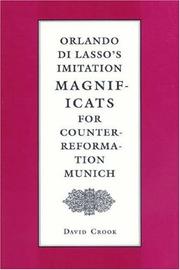
ISBN: 0691601178 1400863783 0691036144 1306984750 0691630933 9781400863785 9780691036144 9780691601175 Year: 1994 Publisher: Princeton, New Jersey : Princeton University Press,
Abstract | Keywords | Export | Availability | Bookmark
 Loading...
Loading...Choose an application
- Reference Manager
- EndNote
- RefWorks (Direct export to RefWorks)
After the Mass Ordinary, the Magnificat was the liturgical text most frequently set by Renaissance composers, and Orlando di Lasso's 101 polyphonic settings form the largest and most varied repertory of Magnificats in the history of European music. In the first detailed investigation of this repertory, David Crook focuses on the forty parody or imitation Magnificats, which Lasso based on motets, madrigals, and chansons written by such composers as Josquin and Rore. By examining these Magnificats in their social, historical, and liturgical contexts and in terms of composition theory, Crook opens a new window on the breadth and subtlety of an important composer often harshly judged on his use of preexistent music.Crook places Lasso amidst the Counter-Reformation reforms at the Bavarian court where he composed the Magnificats, and where there emerged a fanatical Marian cult that favored this genre. In a section on compositional procedure, Crook explains that Lasso abandoned the traditional eight psalm-tone melodies in his imitation Magnificats, considers the new ways he found to represent the tones, and describes how Lasso's experimentation reflected the complex relationship between mode and tone in Renaissance theory and practice. Arguing that Lasso's varied uses of preexistent music defy current definitions of parody technique, Crook, in his final chapter, reveals the imitation Magnificats as vastly more imaginative and innovative than previous characterizations suggest.Originally published in 1994.The Princeton Legacy Library uses the latest print-on-demand technology to again make available previously out-of-print books from the distinguished backlist of Princeton University Press. These editions preserve the original texts of these important books while presenting them in durable paperback and hardcover editions. The goal of the Princeton Legacy Library is to vastly increase access to the rich scholarly heritage found in the thousands of books published by Princeton University Press since its founding in 1905.
Magnificat (Music) --- Church music --- History and criticism --- History and criticism. --- Lasso, Orlando di, --- -Church music --- Pastoral music (Sacred) --- Religious music --- Sacred vocal music --- Devotional exercises --- Liturgics --- Music --- Music in churches --- Psalmody --- Evening service music --- Religious aspects --- Christianity --- Lasso, Orlando di --- Munich (Germany) --- 16th century --- 526.30 --- Genre- en werkbesprekingen
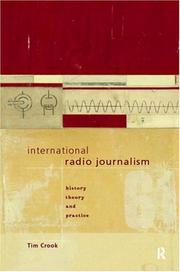
ISBN: 0415096731 0415096723 9780415096737 1134863004 1280321857 0203423232 9780203423233 9780415096720 9786610321858 661032185X 9781134863006 9781280321856 1134862997 Year: 1998 Volume: *14 Publisher: New York : Routledge,
Abstract | Keywords | Export | Availability | Bookmark
 Loading...
Loading...Choose an application
- Reference Manager
- EndNote
- RefWorks (Direct export to RefWorks)
The author explores how radio journalists have documented the major events of the twentieth century.
Radio journalism. --- Journal parlé --- Nieuwsberichten (Radio) --- Radio journalism --- Radio news --- Radionieuws --- Journalism --- Mass communications --- #SBIB:309H1523 --- #SBIB:AANKOOP --- #SBIB:309H301 --- radiojournalistiek --- geschiedenis --- journalistiek --- radio --- 092 --- 094 --- Radio- en/of televisieprogramma's met een informatieve functie --- De communicator in de verschillende media (pers, omroep, film, boekenindustrie, ...) --- journalistiek, pers --- Radio broadcasting of news --- Broadcast journalism --- Radio broadcasting --- Broadcast journalism. --- Broadcast news --- News broadcasting --- Broadcasting --- Press --- Journalistes de radio --- Radio --- Emissions de nouvelles
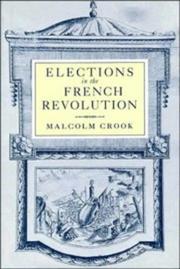
ISBN: 0521451914 0585129738 9780585129730 9780511581809 0511581807 9780521451918 9780521890977 0511000634 0521890977 Year: 1996 Publisher: Cambridge : Cambridge University Press,
Abstract | Keywords | Export | Availability | Bookmark
 Loading...
Loading...Choose an application
- Reference Manager
- EndNote
- RefWorks (Direct export to RefWorks)
This book explores the vital but neglected issue of elections in the French Revolution. Based on extensive research in different regions of France, it is the only general survey to examine the full range of local and national contests, from the Estates General to the advent of Napoleon. Focusing on electoral behaviour, it reveals a fascinating experiment with a quasi-universal suffrage, which established enduring features of French elections. The retention of the traditional practice of voting in assemblies, and a refusal to acknowledge candidates, canvassing and competing political parties, inhibited the emergence of a pluralistic electoral culture. Nonetheless, frequent polling offered unprecedented political opportunities to millions. This revolutionary apprenticeship in democracy left a lasting imprint on the development of modern French citizenship.
Elections --- -Electoral politics --- Franchise --- Polls --- Political science --- Politics, Practical --- Plebiscite --- Political campaigns --- Representative government and representation --- History --- -France --- Politics and government --- -Elections --- Pʻŭrangsŭ --- Frankrig --- Francja --- Frant︠s︡ii︠a︡ --- Prantsusmaa --- Francia (Republic) --- Tsarfat --- Tsorfat --- Franḳraykh --- Frankreich --- Fa-kuo --- Faguo --- Франция --- French Republic --- République française --- Peurancih --- Frankryk --- Franse Republiek --- Francland --- Frencisc Cynewīse --- فرنسا --- Faransā --- Franza --- Republica Franzesa --- Gallia (Republic) --- Hyãsia --- Phransiya --- Fransa --- Fransa Respublikası --- Franse --- Францыя --- Frantsyi︠a︡ --- Французская Рэспубліка --- Frantsuzskai︠a︡ Rėspublika --- Parancis --- Pransya --- Franis --- Francuska --- Republika Francuska --- Bro-C'hall --- Френска република --- Frenska republika --- França --- República Francesa --- Pransiya --- Republikang Pranses --- Γαλλία --- Gallia --- Γαλλική Δημοκρατία --- Gallikē Dēmokratia --- فرانسه --- Farānsah --- צרפת --- רפובליקה הצרפתית --- Republiḳah ha-Tsarfatit --- פראנקרייך --- 法国 --- 法蘭西共和國 --- Falanxi Gongheguo --- フランス --- Furansu --- フランス共和国 --- Furansu Kyōwakoku --- Francija --- Ranska --- Frankrike --- France --- 18th century --- 1789-1799 --- Elections - France - History - 18th century. --- France - Politics and government - 1789-1799. --- Electoral politics --- Arts and Humanities
Book
ISBN: 9811582416 9811582408 Year: 2020 Publisher: Springer Singapore
Abstract | Keywords | Export | Availability | Bookmark
 Loading...
Loading...Choose an application
- Reference Manager
- EndNote
- RefWorks (Direct export to RefWorks)
Audio Drama and Modernism traces the development of political and modernist sound drama during the first 40 years of the 20th Century. It demonstrates how pioneers in the phonograph age made significant, innovative contributions to sound fiction before, during, and after the Great War. In stunning detail, Tim Crook examines prominent British modernist radio writers and auteurs, revealing how they negotiated their agitational contemporaneity against the forces of Institutional containment and dramatic censorship. The book tells the story of key figures such as Russell Hunting, who after being jailed for making ‘sound pornography’ in the USA, travelled to Britain to pioneer sound comedy and montage in the pre-Radio age; Reginald Berkeley who wrote the first full-length anti-war play for the BBC in 1925; and D.G. Bridson, Olive Shapley and Joan Littlewood who all struggled to give a Marxist voice to the working classes on British radio.
Social sciences. --- Music. --- Ethnology—Europe. --- Social Sciences, general. --- British Culture. --- Art music --- Art music, Western --- Classical music --- Musical compositions --- Musical works --- Serious music --- Western art music --- Western music (Western countries) --- Behavioral sciences --- Human sciences --- Sciences, Social --- Social science --- Social studies --- Civilization --- Radio plays --- Radio plays. --- History and criticism. --- Radio drama --- Drama --- Radio programs --- Radio scripts
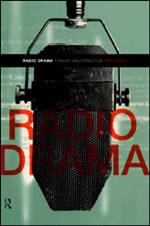
ISBN: 0203190742 113460694X 1280400609 0203006275 9780203190746 0415216028 9780415216029 0415216036 9780415216036 9780203006276 9786610400607 6610400601 9781280400605 9781134606894 9781134606931 9781134606948 1134606931 Year: 1999 Publisher: London ; New York : Routledge,
Abstract | Keywords | Export | Availability | Bookmark
 Loading...
Loading...Choose an application
- Reference Manager
- EndNote
- RefWorks (Direct export to RefWorks)
Radio Drama brings together the practical skills needed for radio drama, such as directing, writing and sound design, with media history and communication theory.
Book
ISBN: 0511043260 9780511043260 0585245126 9780585245126 9781900151245 1900151243 1900151243 Year: 1999 Publisher: [Place of publication not identified] Greenwich Medical Media
Abstract | Keywords | Export | Availability | Bookmark
 Loading...
Loading...Choose an application
- Reference Manager
- EndNote
- RefWorks (Direct export to RefWorks)
Diagnostic Techniques and Procedures --- Diagnosis --- Analytical, Diagnostic and Therapeutic Techniques and Equipment --- Diagnostic Tests, Routine --- Admission Tests, Hospital --- Diagnostic Test, Routine --- Diagnostic Tests --- Examination, Preadmission Physical --- Preadmission Physical Examination --- Routine Diagnostic Test --- Test, Routine Diagnostic --- Tests, Diagnostic --- Tests, Hospital Admission --- Tests, Routine Diagnostic --- Admission Tests, Routine --- Hospital Admission Tests --- Physical Examination, Preadmission --- Routine Diagnostic Tests --- Admission Test, Hospital --- Admission Test, Routine --- Diagnostic Test --- Examinations, Preadmission Physical --- Hospital Admission Test --- Physical Examinations, Preadmission --- Preadmission Physical Examinations --- Routine Admission Test --- Routine Admission Tests --- Test, Diagnostic --- Test, Hospital Admission --- Test, Routine Admission --- Tests, Routine Admission --- Reagent Kits, Diagnostic --- Antemortem Diagnosis --- Diagnoses and Examinations --- Examinations and Diagnoses --- Postmortem Diagnosis --- Diagnose --- Antemortem Diagnoses --- Diagnoses --- Diagnoses, Antemortem --- Diagnoses, Postmortem --- Diagnosis, Antemortem --- Diagnosis, Postmortem --- Postmortem Diagnoses --- Disease --- Diagnostic Technics and Procedures --- Technics and Procedures, Diagnostic --- Techniques and Procedures, Diagnostic --- Diagnostic Testing --- Testing, Diagnostic --- Sensitivity and Specificity --- diagnosis --- methods --- Therapeutics --- Therapy --- Treatment --- Therapeutic --- Therapies --- Treatments --- therapy --- Diagnostic Techniques and Procedures. --- Diagnosis. --- Therapeutics. --- Diagnostic Tests, Routine.
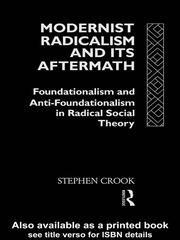
ISBN: 0415755158 1280335963 020316086X 9780203160862 0203327950 9780203327951 9780415028608 0415028604 9780415060813 0415060818 9781134971664 1134971664 9781134971701 1134971702 9781134971718 1134971710 0415028604 0415060818 9780415755153 9780415755153 9781280335969 9786610335961 6610335966 Year: 1991 Publisher: London ; New York : Routledge,
Abstract | Keywords | Export | Availability | Bookmark
 Loading...
Loading...Choose an application
- Reference Manager
- EndNote
- RefWorks (Direct export to RefWorks)
Modernist Radicalism and its Aftermath investigates the ways in which Marx, Durkheim, Althusser and Habermas are all drawn towards foundationalism, and offers a framework for the analysis of foundationalism in social theory.
Sociology --- Radicalism. --- Postmodernism --- Extremism, Political --- Ideological extremism --- Political extremism --- Political science --- Philosophy. --- Social aspects.
Book
ISBN: 0520964543 9780520964549 9780520290341 0520290348 9780520290358 0520290356 Year: 2016 Publisher: Oakland: University of California press,
Abstract | Keywords | Export | Availability | Bookmark
 Loading...
Loading...Choose an application
- Reference Manager
- EndNote
- RefWorks (Direct export to RefWorks)
"When and how did public health become modern? In Governing Systems, Tom Crook re-examines this key question in the context of Victorian and Edwardian England, long regarded as one of the 'homes' of modern public health. The modernity of modern public health, Crook argues, should be located not in the rise of a centralized, bureaucratic and disciplinary State, but in the contested formation and intricate functioning of systems of governing, from the administrative to the technological. Equally, we need to embrace a dialectical understanding of modern governance, one that is rooted in the interaction of multiple levels, agents and times. Theoretically ambitious, but empirically grounded, Governing Systems will be of interest to historians of modern public health and modern Britain, as well as anyone interested in the complex gestation of the governmental dimensions of modernity"--Provided by publisher.
Medical policy --- Public health --- HISTORY / Europe / Great Britain / General. --- Health care policy --- Health policy --- Medical care --- Medicine and state --- Policy, Medical --- Public health policy --- State and medicine --- Science and state --- Social policy --- Community health --- Health services --- Hygiene, Public --- Hygiene, Social --- Public health services --- Public hygiene --- Social hygiene --- Health --- Human services --- Biosecurity --- Health literacy --- Medicine, Preventive --- National health services --- Sanitation --- History --- 19th century --- England. --- 20th century --- Government policy --- Public health - England - History - 19th century --- Public health - England - History - 20th century --- Medical policy - England - History - 19th century --- Medical policy - England - History - 20th century --- 1800s. --- 1900s. --- 19th century. --- 20th century. --- agency. --- british history. --- bureaucracy. --- criticism. --- death rate. --- disease. --- early 20th century. --- edwardian england. --- european history. --- government. --- health and safety. --- health and wellness. --- humanity. --- medical. --- medicine. --- modern society. --- modern world. --- modernity. --- philosophy. --- political. --- politics. --- public health. --- public safety. --- social studies. --- systems of government. --- theoretical. --- victorian england. --- world history.
Book
ISBN: 0809333880 9780809333882 9780809333875 0809333872 Year: 2015 Publisher: Carbondale : Southern Illinois University Press,
Abstract | Keywords | Export | Availability | Bookmark
 Loading...
Loading...Choose an application
- Reference Manager
- EndNote
- RefWorks (Direct export to RefWorks)
Throughout Salt Moon, Noel Crook forges the kind of tragic vision Howard Nemerov described as the mark of our finest poets: drawing on myth and memory, Crook's fierce lyrics reveal a world that is at once "hopeless and beautiful . . . giving equal emphasis to both words." Sacrifice and betrayal, parental love and patricide, unleased desire and cornered despair-these antitheses fuel Crook's Ovidian imagination, which ranges freely from Comanche raids in Texas to a slave plantation in North Carolina, from a carpet maker in Istanbul to beggars in Delhi, from her daughter's hospital room to the wa
| Listing 1 - 10 of 37 | << page >> |
Sort by
|

 Search
Search Feedback
Feedback About UniCat
About UniCat  Help
Help News
News